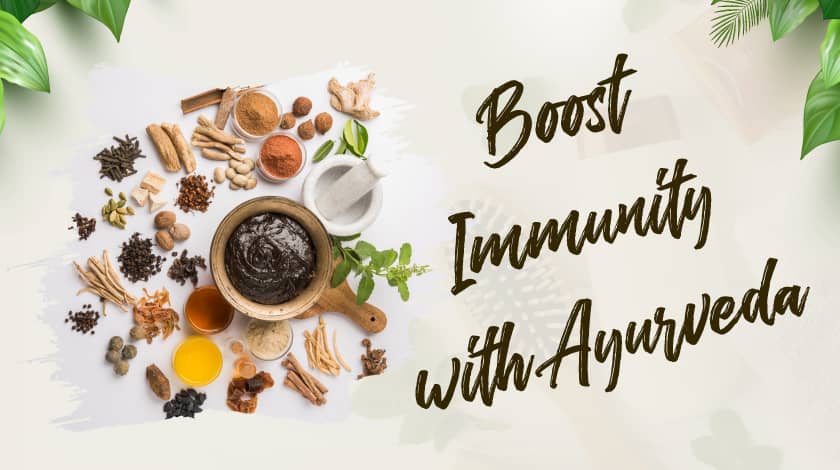Tips to Strengthen Your Immunity with Ayurveda

Staying healthy and boosting immunity have become a priority in recent times. Our less-than-desirable lifestyles and working practices have led to the destruction of our bodies and immune systems, and boosting the immune system have become key. Especially in the current circumstances where there are increasing health issues of unknown cause and effect.
Ayurveda and its methods are the best way to do this naturally without affecting the body’s cycle and functioning. Ayurveda is a traditional system of medicine that originated in India and has been practised for over 5,000 years. It is based on the belief that health and wellness depend on a balance between the body, mind, and spirit.
According to Ayurveda, immunity is closely linked to digestion and the health of the digestive system. Therefore, boosting immunity through Ayurveda often involves making lifestyle and dietary changes to support digestion and overall health. Here are some specific ways to boost immunity through Ayurveda:
Eat Healthy
Ayurveda emphasises the importance of eating a diet that is balanced and nourishing for your unique body type or dosha. This means choosing foods that are fresh, whole, and seasonal and avoiding processed and fried foods. Incorporating a variety of fruits and vegetables, including leafy greens, root vegetables, and berries, can help support a healthy immune system. Additionally, incorporating immune-boosting herbs and spices, such as turmeric, ginger, and garlic, can help support the immune system.
Incorporate Immune-boosting Herbs and Supplements
Ayurveda uses a variety of herbs and supplements to support the immune system. Some popular options include amla (Indian gooseberry), ashwagandha, and liquorice root. Consult with a qualified Ayurvedic practitioner to determine the best herbs and supplements for your unique needs.
Guduchi (Giloy): A star herb with various medicinal properties and immune modulator action, Guduchi has various antiviral and antibacterial properties. It helps fight pathogens by developing specific antibodies.
Trikatu: Trikatu is a traditional ayurvedic formulation made from Shunti, Maricha and Pippali that acts as a digestive aid for the digestion of healthy fats. It also promotes healthy metabolism and prevents congestion in the lungs.
Chywanprash: It is an ayurvedic formulation made from various herbs and spices. It helps in restoring the Ojas or life force in the body and preserves strength, stamina, and vitality while stalling the course of ageing.
Ashwagandha (winter cherry): A unique herb with strengthening characteristics, Ashwagandha is full of antioxidants that support the immune system by improving the quality of tissues in the body. They also help build Ojas and nourish our tissues together with Shatavari and Bala.
Tulsi (Ocimum sanctum): Tulsi, or holy basil, is a herb that can act as an overall tonic for the body. It is one of the best herbs for the mind as it pacifies both physical and psychological ailments. It also strengthens the respiratory system and the lungs by removing the excess Kapha and relieving the symptoms of colds, congestions, cough, bronchitis, and sore throat.
Drink Warm Water and Stay Hydrated
Drinking warm water throughout the day can help support digestion and flush out toxins from the body. It can also help to keep the body hydrated, which is important for overall health and immunity.
Drinking plenty of fluids, especially water, can help support the immune system by flushing out toxins and keeping the body hydrated. Aim for at least 8 cups of fluids per day, and drink more during times of illness or increased physical activity.
Stay Rested
Adequate sleep is essential for a healthy immune system. Aim for 7-8 hours of sleep per night, and create a sleep-friendly environment by keeping the bedroom dark, quiet, and cool.
Practice Stress-Reducing Techniques
Stress can weaken the immune system, so it's important to find ways to manage stress. Ayurveda recommends practices such as yoga, meditation, and pranayama (breathing exercises) to help reduce stress and promote overall well-being.
Exercise Regularly: Practise Yoga
Regular physical activity can help boost the immune system by increasing blood flow and promoting the release of endorphins, which can help improve mood and reduce stress. Aim for at least 30 minutes of moderate-intensity exercises, such as walking or cycling, most days of the week. Practise yoga, especially the Surya Namaskara, at least 10 times a day.
Avoid Excess Alcohol and Caffeine
While moderate amounts of alcohol and caffeine may not harm the immune system, excessive consumption can weaken the immune system and make you more susceptible to illness. Limit alcohol to one drink per day for women and two drinks per day for men, and try to limit caffeine to no more than 300 mg per day.
Incorporate Self-Massage
Ayurveda recommends the practice of abhyanga, or self-massage, to boost the immune system. Using warm oil, such as sesame or coconut oil, can help nourish the skin and improve circulation. Massage the oil into the skin in a circular motion, focusing on the feet, hands, and head.
Follow Good Hygiene Practices
Basic hygiene practices, such as washing your hands regularly and covering your mouth and nose when you cough or sneeze, can help reduce the spread of illness and boost your immune
Conclusion
To conclude, boosting immunity through Ayurveda involves making lifestyle and dietary changes to support overall health and well-being. This includes eating a nourishing diet, drinking warm water, getting enough rest, practising stress-reducing techniques, incorporating immune-boosting herbs and supplements, exercising regularly, staying hydrated, avoiding excess alcohol and caffeine, incorporating self-massage, and following good hygiene practices.
By incorporating these practices into your daily routine, you can support your immune system and improve your overall health and well-being. It's important to consult with a qualified Ayurvedic practitioner before making any significant changes to your diet or lifestyle, as every person's needs are unique.

